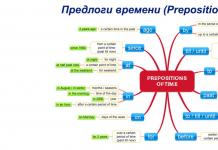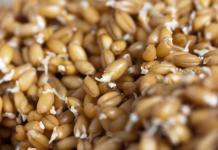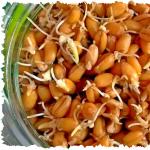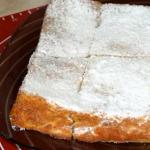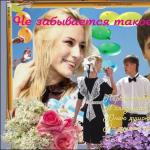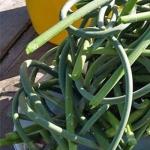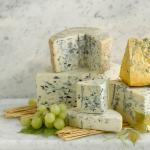1. Read the information .
Uncommon proposal- a sentence that consists only of the main members (subject and predicate).
Common Suggestion- a sentence in which, in addition to the main ones (subject and predicate), there is also minor members proposals (addition, definition, circumstance).
2. Consider examples uncommon and common offers.
|
Sentence |
Example |
|
Uncommon |
The birds are singing. |
|
The stream is ringing. |
|
|
Common |
Elk easy running through the swamps. |
|
Cats love the pungent scent of valerian. |
The location of the subject and predicate in non-common sentences may look like this.
- Subject + predicate. The birches turned yellow.
- Predicate + subject. Lightning flashed.
- Subject + predicate, predicate. Everything is green and blooming.
- Subject + predicate, predicate, predicate. The cubs played, fought, tumbled.
- Subject + predicate AND predicate.
- Predicate + subject AND subject. Winter and spring meet.
- Predicate + subject, subject, subject AND subject. Apple trees, pears, cherries and plums blossomed.
Predicate AND predicate + subject, subject AND subject. Bushes, trees and blades of grass awaken and come to life.
Simple common sentences. Examples on the topic - HOW THE ANIMALS ARE PREPARING FOR WINTER
Examples of simple common sentences with the word - AUTUMN
Examples of simple common sentences with the word - WIND
How to make an uncommon offer - THE EARTH IS RICH - common
EXAMPLES OF UNCOMMON OFFERS.
Offers are located in alphabetical order(according to the letter of the first word in the sentence).
BUT
The storks got scared and hid.
B
The birch is alive. The birches turned yellow. The snake flashed. Lightning flashed.
Bears roam. It was September.
AT
A blizzard is blowing. The wind is noisy. The wind howls. The thread has wobbled. The lark flew up. The sun has risen. The water darkened. The cubs played, fought, tumbled. Sparrow calmed down. The sparrow took off. Here is the blizzard. Here comes the squirrel. Everything is green and blooming. Everything is frozen.
Everything sparkles and sparkles. Everything turned yellow. Everything is awakening. Winter and spring meet. The sun came out. Water came out.G
Thunder boomed. Bees and bumblebees are buzzing.
D
The tree swayed. The trees swayed. The trees withered, degenerated.
The rain is drizzling. Rain stopped. The house lit up. The road is frozen. The wind's blowing.E
Hedgehogs play, frolic.
W
Nature is sad. The birds were silent. The kitten meowed. The sun shone.
The pond also fell asleep. Frost crackled. The bushes crackled. Apple trees, pears, cherries and plums blossomed. The firs rustled. The hare looked around. The earth trembled.
The animals hid.There lived a grandfather and a woman. Streams murmur.And
It's raining. There is a storm.
To
The carriage pulled up and stopped.The frogs croaked.The holidays are over. The snow was circling. L The ice cracked. The forest was noisy. The forest is alive. The forest came to life, rustled. The forest has thinned.The forest brightened up. The forest is sleeping. The leaves flew off. Leaves trembled, tore off and flew. Leaves fell and fell. The fishing has begun. It's raining. It's raining. People ran. People listened and smiled. The frogs croaked.
M
The boy fell. A shadow flickered. Silent fields and forests.The forest, and the wind, and the water are silent. The frost was getting stronger. Frost crackles.
A hairy bumblebee flew up to the daisies and buzzed loudly. The ants fussed. The ants are busy. We fell silent.
H
A cloud ran up. The wind came up. Autumn has come. Twilight came on. Evening came. Dawn has come. Morning has come. The cold has come. The storm has begun. The snowfall has begun. The sky turned black. The sky cleared up.
The sky is overcast. Nora collapsed.
O
The lake is frozen. She considered. Leaves are falling.P
Snow falls. Snow fell. The sun was beating down. Moose graze. The songs are silent.
The snow ran. Brooks ran. It snowed. The carriage jumped.
The weather has changed. Dust has risen. The bunnies grew up and grew bolder.
The winds blew. Approach it autumn. The sun appeared. The strawberries ripen.
Apples, pears and plums ripened. Snowflakes fell. The branches fell down.Streams flowed. The kidneys are swollen. Birds are singing. A swallow appeared.
There are chanterelles, mushrooms, russula, raincoats, butterflies.
Dandelions appear. Winter will come. The wagtail has arrived. Nature fell asleep. Nature is alive. Silent fields, forests. The little men got bored.Summer has come . Animals run by. Moose run by. Birds fly by.
It rained. The cold is refreshing and invigorating. The storm has passed. The fox ran. A mouse ran. Bushes, trees and blades of grass awaken and come to life. The owl screamed. The grasshopper woke up. The summer has passed. Autumn has passed too. A mouse darted. The distances are clearing up. The bird got up and flew away.
The birds are in a hurry.
R
Work has stopped. The work didn't stop. There were voices.
The bell rang. There was a crack. Bells, forget-me-nots are blooming.
The guys are gone. The river is frozen. The river has become The lynx froze.FROM
The seedlings took root, got stronger, grew up. Lightning flashed.
Oriole whistles. Voices are heard. A call is heard. Sounds and voices are heard. Snow sparkles, sparkles. The snow has melted. The snow has come down. The dog stopped. The sun was setting. The pines are frozen. Worth December.
Grasshoppers chirp. The arrow moved.
T
Snow is melting. The silence is worth it.
At
Wither, leaves turn yellow. Lightning struck.X
The downpour poured down. Bough crunched.
C
Willows bloomed. Lilies of the valley, dandelions and strawberries bloom.The flowers withered, turned yellow.
W
The whisper subsides. The bumblebee is buzzing. Noisy, raging bad weather.
SCH
The puppy whined.
I
I stood and listened. I've calmed down. The lizards are gone.
3. Let's complete online tasks .
Tests on the topic "Offers"
1. Read the information .
Uncommon proposal- a sentence that consists only of the main members (subject and predicate).
Common Suggestion- a sentence in which, in addition to the main ones (subject and predicate), there are also secondary members of the sentence (addition, definition, circumstance).
2. Consider examples uncommon and common offers.
|
Sentence |
Example |
|
Uncommon |
The birds are singing. |
|
The stream is ringing. |
|
|
Common |
Elk easy running through the swamps. |
|
Cats love the pungent scent of valerian. |
The location of the subject and predicate in non-common sentences may look like this.
- Subject + predicate. The birches turned yellow.
- Predicate + subject. Lightning flashed.
- Subject + predicate, predicate. Everything is green and blooming.
- Subject + predicate, predicate, predicate. The cubs played, fought, tumbled.
- Subject + predicate AND predicate.
- Predicate + subject AND subject. Winter and spring meet.
- Predicate + subject, subject, subject AND subject. Apple trees, pears, cherries and plums blossomed.
Predicate AND predicate + subject, subject AND subject. Bushes, trees and blades of grass awaken and come to life.
Simple common sentences. Examples on the topic - HOW THE ANIMALS ARE PREPARING FOR WINTER
Examples of simple common sentences with the word - AUTUMN
Examples of simple common sentences with the word - WIND
How to make an uncommon offer - THE EARTH IS RICH - common
EXAMPLES OF UNCOMMON OFFERS.
The sentences are arranged alphabetically (according to the letter of the first word in the sentence).
BUT
The storks got scared and hid.
B
The birch is alive. The birches turned yellow. The snake flashed. Lightning flashed.
Bears roam. It was September.
AT
A blizzard is blowing. The wind is noisy. The wind howls. The thread has wobbled. The lark flew up. The sun has risen. The water darkened. The cubs played, fought, tumbled. Sparrow calmed down. The sparrow took off. Here is the blizzard. Here comes the squirrel. Everything is green and blooming. Everything is frozen.
Everything sparkles and sparkles. Everything turned yellow. Everything is awakening. Winter and spring meet. The sun came out. Water came out.G
Thunder boomed. Bees and bumblebees are buzzing.
D
The tree swayed. The trees swayed. The trees withered, degenerated.
The rain is drizzling. Rain stopped. The house lit up. The road is frozen. The wind's blowing.E
Hedgehogs play, frolic.
W
Nature is sad. The birds were silent. The kitten meowed. The sun shone.
The pond also fell asleep. Frost crackled. The bushes crackled. Apple trees, pears, cherries and plums blossomed. The firs rustled. The hare looked around. The earth trembled.
The animals hid.There lived a grandfather and a woman. Streams murmur.And
It's raining. There is a storm.
To
The carriage pulled up and stopped.The frogs croaked.The holidays are over. The snow was circling. L The ice cracked. The forest was noisy. The forest is alive. The forest came to life, rustled. The forest has thinned.The forest brightened up. The forest is sleeping. The leaves flew off. Leaves trembled, tore off and flew. Leaves fell and fell. The fishing has begun. It's raining. It's raining. People ran. People listened and smiled. The frogs croaked.
M
The boy fell. A shadow flickered. Silent fields and forests.The forest, and the wind, and the water are silent. The frost was getting stronger. Frost crackles.
A hairy bumblebee flew up to the daisies and buzzed loudly. The ants fussed. The ants are busy. We fell silent.
H
A cloud ran up. The wind came up. Autumn has come. Twilight came on. Evening came. Dawn has come. Morning has come. The cold has come. The storm has begun. The snowfall has begun. The sky turned black. The sky cleared up.
The sky is overcast. Nora collapsed.
O
The lake is frozen. She considered. Leaves are falling.P
Snow falls. Snow fell. The sun was beating down. Moose graze. The songs are silent.
The snow ran. Brooks ran. It snowed. The carriage jumped.
The weather has changed. Dust has risen. The bunnies grew up and grew bolder.
The winds blew. Approach it autumn. The sun appeared. The strawberries ripen.
Apples, pears and plums ripened. Snowflakes fell. The branches fell down.Streams flowed. The kidneys are swollen. Birds are singing. A swallow appeared.
There are chanterelles, mushrooms, russula, raincoats, butterflies.
Dandelions appear. Winter will come. The wagtail has arrived. Nature fell asleep. Nature is alive. Silent fields, forests. The little men got bored.Summer has come . Animals run by. Moose run by. Birds fly by.
It rained. The cold is refreshing and invigorating. The storm has passed. The fox ran. A mouse ran. Bushes, trees and blades of grass awaken and come to life. The owl screamed. The grasshopper woke up. The summer has passed. Autumn has passed too. A mouse darted. The distances are clearing up. The bird got up and flew away.
The birds are in a hurry.
R
Work has stopped. The work didn't stop. There were voices.
The bell rang. There was a crack. Bells, forget-me-nots are blooming.
The guys are gone. The river is frozen. The river has become The lynx froze.FROM
The seedlings took root, got stronger, grew up. Lightning flashed.
Oriole whistles. Voices are heard. A call is heard. Sounds and voices are heard. Snow sparkles, sparkles. The snow has melted. The snow has come down. The dog stopped. The sun was setting. The pines are frozen. Worth December.
Grasshoppers chirp. The arrow moved.
T
Snow is melting. The silence is worth it.
At
Wither, leaves turn yellow. Lightning struck.X
The downpour poured down. Bough crunched.
C
Willows bloomed. Lilies of the valley, dandelions and strawberries bloom.The flowers withered, turned yellow.
W
The whisper subsides. The bumblebee is buzzing. Noisy, raging bad weather.
SCH
The puppy whined.
I
I stood and listened. I've calmed down. The lizards are gone.
3. Let's complete online tasks .
Tests on the topic "Offers"
They are much more common than uncommon. This is due to the fact that the former offer the writer much more scope for detail: different ways spreading the sentence opens up new facets of artistic wealth, allows you to weave metaphors and interesting details into the text. This article will consider examples of common proposals that differ in the method of distribution, composition, complexity, and other criteria.
Sentences extended by definitions
Definitions are purely descriptive tools. With their help, you cannot fill the sentence with any kind of certainty or specificity, but you can make them more colorful. Here are some examples of common sentences that use definitions:
It is easy to see that the sentences from the second column are brighter, more colorful, and more interesting.
Offers common circumstances

Circumstances are a kind of artist's tools that can characterize and embellish actions, add specificity to them, and completely change the tone of a sentence. Compare:
As examples of common sentences show, circumstances can significantly change, distort the meaning and fill it with bright colors.
Offers distributed by add-ons

This distribution method works effectively only in combination with the others, but in the end you can get a very convincing result. For example:
Examples of common sentences and the uncommon passages from which they were formed prove that additions, circumstances, and definitions are a key tool artistic expressiveness.
Complicated sentences
A separate group of common proposals is complicated. You can complicate the offer homogeneous members, appeals, participial and participle turnovers. Here is an example of such a proposal:
- Colleague, I saw a case that interested you. (Appeal - "colleague", participial- "interested you").
One-part sentences
One-part sentences can also be common. For example:
- This morning it was getting light slowly, measuredly, gradually.
- Noisy, cheerful evening in good company.
In the first case, there is no subject in the sentence, in the second there is no predicate, but these are still full-fledged common sentences.
Complex sentences
By themselves complex sentences cannot be considered common, but they can be distributed in the same way as simple ones. For example:
- It had been raining since the morning, passers-by did not let go of their umbrellas, and motorists were angry because it was impossible to understand exactly where the pits were due to puddles on the roads.
All sentences in Russian are built according to a certain type, depending on the presence / absence of certain elements, the meaning or construction of the smallest communicative unit.
So, for example, if we analyze sentences from the point of view of the purpose of the statement, we can see three types:
Narrative, containing information (I went to school.)
Interrogative (Will you go to college?)
Incentives (Go to class.)
Regardless of the purpose of the utterance, the sentence may have other characteristics. For example, according to intonation, one construction can be either non-exclamatory (I have come.) Or exclamatory (I have come!).
If we consider the basis of the proposal, then we can single out single-component structures (with one main member) or two-component structures (with a full basis) - It is dawning. Think about your actions. Silence. (Single-part). I like summer very much. (two-part).
Finally, this syntactic structure can be considered from the point of view of the presence or absence of secondary members.
Common sentences consist of and count. However, in order for a sentence to be common, it is not necessary " full set» secondary members, and at least one of them is enough. (In the morning school teachers preparing for lessons. The notebook is on the table. Came new employee. I'll be back in the morning). All the examples given are common sentences with a different "set" of secondary members.
Accordingly, those constructions that have no other members, except for the grammatical basis - Silence, are considered non-common. It's getting light. The city is waking up.
From the foregoing, the conclusion follows: non-common and common sentences can be different in intonational coloring. (Bring a book! Please don't cry. Are you crying? How can you?!)
Very often, students allow blunder, using the phrase "a simple common sentence." It is impossible to say so, because the category of prevalence / non-proliferation applies only to. If we are talking about complex, then we should speak separately about each of its parts. Let's take an example.
It is dawning, and the ice covering the puddles begins to melt.
narrative (according to the purpose of the statement);
non-exclamatory (according to intonation);
complex (according to the number of parts or grammatical bases);
compound, because its parts are connected by a coordinating connecting union, indicating that the action of the parts occurs simultaneously;
The first part ("Dawn") is a simple one-part uncommon sentence;
The second part is a simple, two-part, common sentence.
Minor members can refer to any member of the sentence. Their task is to expand, clarify or clarify the meaning - The guest entered the room. The new guest timidly entered the crowded room.
When analyzing a sentence, one should not lose sight of the fact that the categories of prevalence or non-proliferation are accepted in school grammar. In academic Russian, these features are studied more deeply, which the school curriculum does not take into account. Therefore, discrepancies in the concept of "common and non-common proposals" are sometimes possible. For example, from the point of view of the school curriculum, appeals or are not members of the proposal, therefore, they cannot distribute it. Therefore, the design "Vanya, let's go!" will be considered simple, one-component, uncommon offer, complicated handling. From the point of view of some linguists, the independent word form (“Vanya”) introduced into the construction makes it possible to consider the sentence as widespread.
A common sentence is a simple sentence (see), which (in contrast to a non-common sentence; see) includes secondary members that explain and clarify the subject, predicate or the sentence as a whole. The expansion of the composition of the sentence occurs due to words and phrases that appear in the form predetermined by the subject or predicate, or in the form fixed in language system to express certain components of the meaning of the sentence, for example: Did not come due to illness; * Snow clogged into the collars of windbreakers - squeezed the throat with an ice hoop * (Semyonov-Spassky); *Shut up about this! Morozna tried not to remember the trip to the hospital* (Fadeev). In an educated various kinds subordination(coordination, management, adjoining) the phrase has definitive, object or subject relations, for example: do not remember the trip - management, object relations; a trip to the hospital - poor management, defining relationships.
The syntactic position of word forms that spread the entire sentence as a whole is at the beginning or less often at the end of the sentence. In one sentence there can be several such distributors (determinants, see), characterizing the sentence from different angles, having a subjective, objective or adverbial meaning, for example: “She has eyes navy blue, She has an unfaithful soul * (Balmont); * On your face, tenderly unsteady. The white beam pretended to smile...* (Annensky); * With the rink and parents became much calmer * (Nosov).
The internal composition of a sentence can be extended by a name, more often by a pronoun, in the form of dates. etc., which indicates the direction of the action, for example: * The bullet went through his very heart * (Turgenev). This role can be played by the infinitive, for example: Give paper to write a letter; gerund: Go away, go away.
A sentence is widespread if it contains open or closed rows of clarifying definitions, additions or circumstances united by an allied or non-union connection, for example:<Лишь снег порхает - вечный, белый. Зимой - он площадь оснежит...* (Блок); *Вся моя жизнь озарилась любовью, именно вся, до самых мелочей, словно тёмная, заброшенная комната, в которую внесли свечку* (Тургенев).
The sentence is also extended by adding clarifying groups of word forms that are in a semi-predicative relationship with a sentence or a single word. These isolated semantic groups are distinguished intonationally, in writing - by commas or dashes, for example: ^ Throwing it [net], to the complete surprise of everyone, missed and captured only a jug with it ... * (Bulgakov); * So Margarita Nikolaevna whispered, looking at the crimson curtains pouring in the sun, restlessly dressing, combing her short curled hair in front of a triple mirror * (Bulgakov).
A common sentence is the introduction of syntactically independent word forms - appeals, plug-in structures, for example: * You are dear to me, it's sunset time * (Pleshcheev); * A wonderful musician came to her (I was friends with him) I. Dobrovsin * (Pasternak).
The terms R. P." and "uncommon sentence" are accepted primarily in school grammar.
